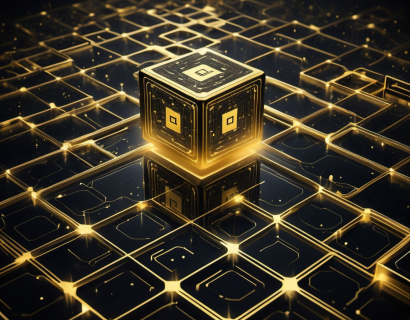Crypto-Powered Innovations: Exploring Decentralized Apps and AI-Driven Services in the Ucosystem
The digital landscape is undergoing a profound transformation, driven by the convergence of cryptocurrency, decentralized technologies, and artificial intelligence. This comprehensive guide delves into the exciting world of decentralized applications (dApps) and AI-driven services, highlighting their potential to reshape various industries and enhance user experiences. Whether you are a tech-savvy individual interested in cryptocurrency, an AI enthusiast, or an early adopter of decentralized applications, this article aims to provide valuable insights into the future of technology.
Understanding Decentralized Applications
Decentralized applications, or dApps, are software applications that run on a blockchain or a decentralized network, rather than on a central server. This fundamental difference from traditional applications offers several advantages, including enhanced security, transparency, and resilience against censorship. dApps leverage smart contracts, which are self-executing contracts with the terms of the agreement directly written into code, to automate and enforce the rules of the application.
The architecture of a typical dApp includes a frontend user interface, a backend smart contract, and a decentralized storage system. The frontend interacts with the user, while the backend smart contract manages the core logic and rules. Decentralized storage solutions, such as IPFS (InterPlanetary File System), ensure that data is stored across multiple nodes, making it more robust and less vulnerable to single points of failure.
Key Characteristics of dApps
- Decentralization: dApps operate on a distributed network, eliminating the need for a central authority.
- Transparency: All transactions and data are recorded on a public blockchain, ensuring transparency and traceability.
- Security: The use of cryptographic techniques and decentralized consensus mechanisms enhances security.
- User Control: Users have full control over their data and assets, with no intermediary dictating terms.
Use Cases of Decentralized Applications
dApps have found applications across various sectors, demonstrating their versatility and potential impact. Here are some notable use cases:
Finance and Banking
Decentralized finance (DeFi) platforms offer a range of financial services without traditional intermediaries. These include lending, borrowing, trading, and yield farming. Smart contracts ensure that transactions are executed automatically and securely, reducing the risk of fraud and increasing efficiency. For instance, a decentralized lending platform allows users to lend and borrow cryptocurrencies, with interest rates determined by market demand and supply.
Supply Chain Management
In supply chain management, dApps can provide end-to-end traceability and transparency. By recording each step of the supply chain on a blockchain, stakeholders can verify the authenticity and origin of products. This is particularly useful in industries like pharmaceuticals, where ensuring the integrity of products is critical. A decentralized supply chain platform can help reduce counterfeiting and improve efficiency.
Gaming
The gaming industry is another area where dApps are making significant strides. Decentralized gaming platforms allow players to own and trade in-game assets as non-fungible tokens (NFTs). These assets are unique and verifiable, giving players true ownership. Additionally, game developers can create more engaging and rewarding experiences by leveraging blockchain technology to manage in-game economies and reward systems.
AI-Driven Services in the Ucosystem
Artificial intelligence (AI) is revolutionizing the way we interact with technology, and when combined with blockchain, it creates powerful AI-driven services. These services can enhance the functionality and user experience of decentralized applications, making them more intelligent, efficient, and user-friendly.
Enhanced User Interfaces
AI can significantly improve the user interface of dApps by providing more intuitive and personalized experiences. For example, AI-powered chatbots can assist users in navigating complex dApps, answering queries, and guiding them through processes. These chatbots can operate 24/7, offering consistent and high-quality support.
Data Analysis and Insights
AI algorithms can analyze large datasets to uncover valuable insights, which can be particularly useful in decentralized applications. For instance, in a decentralized market place, AI can analyze user behavior and market trends to optimize pricing and recommend products. This not only enhances the user experience but also increases the efficiency and profitability of the platform.
Automated Decision Making
Smart contracts combined with AI can enable automated decision-making processes. For example, in a decentralized insurance platform, AI can assess risk factors and automatically adjust premiums based on real-time data. This reduces the need for manual intervention and ensures that policies are fair and up-to-date.
Intersection of Cryptocurrency and AI
The integration of cryptocurrency and AI creates a synergistic effect, driving innovation and opening new possibilities. Cryptocurrency provides the necessary infrastructure for decentralized applications, while AI enhances their functionality and user experience. Here are some key aspects of this intersection:
Tokenization of Assets
Tokenization, the process of converting real-world assets into digital tokens on a blockchain, is facilitated by cryptocurrency. AI can optimize tokenization by analyzing market conditions and predicting assetvalues, helping to create more accurate and valuable tokens. This is particularly relevant in areas like real estate, where tokenized properties can be bought, sold, and traded more easily.
Decentralized AI Marketplaces
Decentralized AI marketplaces allow developers and businesses to access a wide range of AI models and services without the need for intermediaries. These marketplaces can be powered by cryptocurrency, ensuring secure and transparent transactions. AI models can be bought, sold, or rented, and AI developers can earn tokens for their creations. This democratizes access to advanced AI technologies and fosters innovation.
Enhanced Security and Privacy
The combination of blockchain and AI can lead to more secure and private applications. Blockchain ensures that data is immutable and transparent, while AI can be used to detect and prevent malicious activities. For example, AI-driven security systems can monitor blockchain networks for anomalies and potential threats, enhancing the overall security of decentralized applications.
Challenges and Considerations
While the potential of decentralized applications and AI-driven services is vast, there are several challenges and considerations that need to be addressed:
Scalability
One of the main challenges for blockchain-based applications is scalability. As the number of users and transactions increases, blockchain networks can become congested, leading to slower tran



